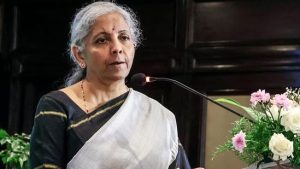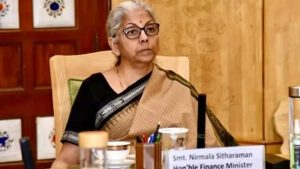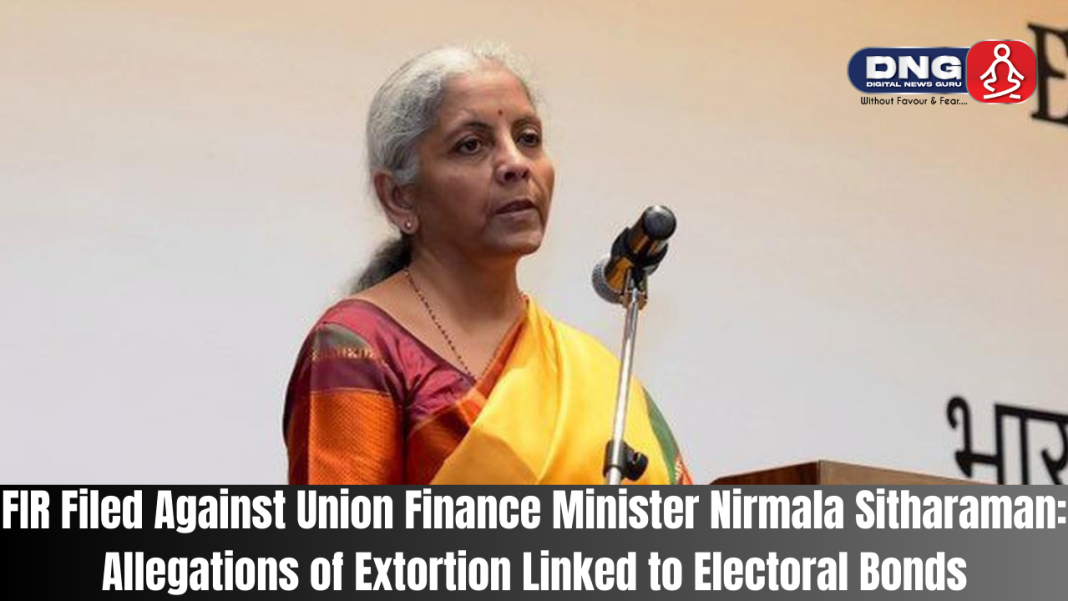DIGITAL NEWS GURU DELHI DESK:
FIR Filed Against Union Finance Minister Nirmala Sitharaman: Allegations of Extortion Linked to Electoral Bonds
A significant legal development occurred when a Bengaluru court ordered the registration of a First Information Report (FIR) against Union Finance Minister Nirmala Sitharaman.
This action stems from allegations of extortion linked to the controversial electoral bonds scheme, a subject that has been under scrutiny since its inception.
Background of the Case

The allegations against Sitharaman stem from a private complaint filed by activist Adarsh Ayyar on April 15, 2024. Ayyar had initially approached the police, seeking an investigation into the electoral bonds scheme, which allows anonymous political donations. However, when the police declined to register an FIR, he opted to file a complaint directly with the court, which ultimately led to the recent court order.
The FIR was prompted by a complaint from Adarsh Iyer, a member of the Janaadhikara Sangharsha Parishath (JSP). He accused Sitharaman and several other individuals, including officials from the Enforcement Directorate (ED) and various BJP office-bearers, of engaging in extortion under the guise of the electoral bonds scheme, which was designed to enhance transparency in political funding. However, the scheme faced criticism for potentially enabling corruption, leading the Supreme Court to declare it unconstitutional earlier this year.

The court’s decision to allow the FIR reflects the serious nature of the allegations. Iyer’s complaint alleges that the accused benefited by over Rs 8,000 crores through unlawful means related to electoral bonds.
The FIR cites sections of the Indian Penal Code including 384 (punishment for extortion), 120B (criminal conspiracy), and 34 (acts done by several persons in furtherance of common intention), underscoring the gravity of the situation.
Electoral Bonds Scheme: Controversy and Criticism

The electoral bonds scheme, introduced in 2018, was intended to replace cash donations to political parties with these bonds, supposedly fostering transparency in political donations. However, critics have argued that it masked the true sources of political funding, allowing significant sums of money to be funneled into political parties without accountability. The Supreme Court’s ruling in February, which invalidated the scheme, highlighted its violation of citizens’ right to information.
In response to the FIR, Karnataka Chief Minister Siddaramaiah has called for Nirmala Sitharaman to resign. He emphasized that, given the serious allegations, it would be appropriate for her to step down while the investigation unfolds. This demand is particularly pointed given the ongoing political tensions in Karnataka, where the ruling Congress party and the opposition BJP are often at odds.
The situation escalates the existing political rivalry, especially as Siddaramaiah himself faces scrutiny over a separate corruption case involving the Mysuru Urban Development Authority. He argued that if an FIR has been filed against Sitharaman, the BJP should similarly demand her resignation, thus placing pressure on the opposition party to maintain a consistent stance on accountability.
As this legal and political drama unfolds, it raises crucial questions about the integrity of political funding in India and the accountability of public officials. The implications of the FIR could extend beyond mere legal proceedings, potentially influencing public perception and political alignments ahead of upcoming elections.
Conclusion
The FIR against Nirmala Sitharaman represents a pivotal moment in Indian politics, raising critical questions about electoral integrity and the influence of money in politics. As the legal proceedings unfold, it will be essential to monitor the reactions from both the government and the opposition, as well as the public discourse surrounding political funding. The outcome of this case could not only impact Sitharaman’s political future but also set the stage for much-needed reforms in the electoral financing system in India.
YOU MAY ALSO READ: The West Bengal government has decided to discontinue Kolkata’s historic 150 years old trams services








